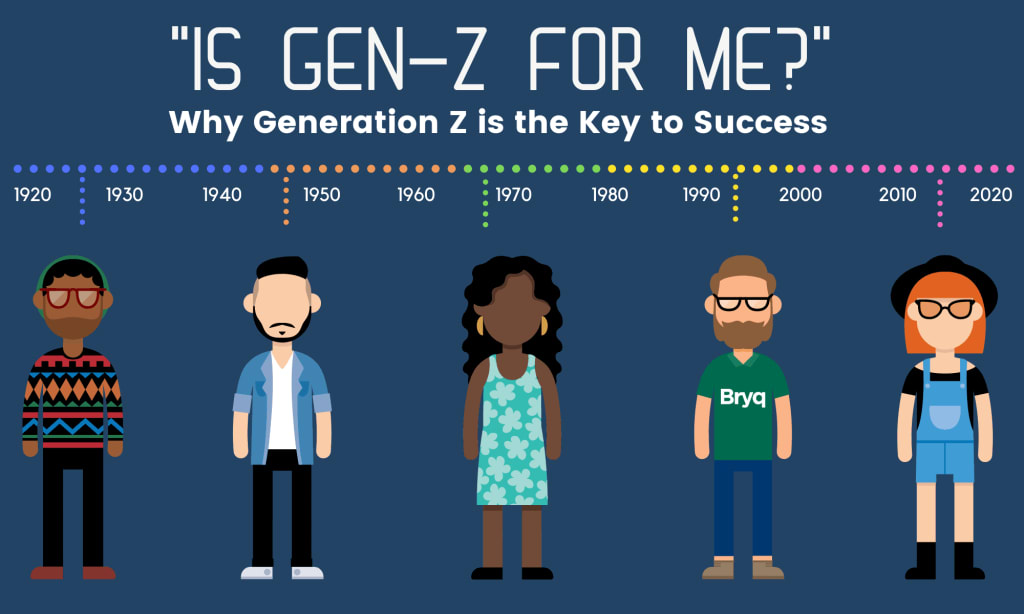How Generation Z Is Getting More Involved In Investing
New trends in investing

Gen Z or also known as Generation Zoomers is the generation that follows the Millennials but before Generation Alpha. They are mostly members of Generation X, having been born between the second half of the 1990s and the first part of the 2010s (aka the latchkey generation). According to Morgan Stanley, by 2034, Gen Z will be the biggest generation in the United States, with a population of 78 million people. As the first generation to have access to portable digital technology at an early age, Gen Zers are considered digital natives.
When the first iPhone debuted, the youngest user was just five years old. People of this age have no idea what life was like before cell phones. When it comes to money transfer applications like Venmo and Zelle, Morgan Stanley found that 3 in 4 Gen Zers use them monthly and that 60% of Gen Zers had a smartphone by the time they were 14.
Social media has become an integral part of Gen Zers' everyday existence. For Gen Zers, TikTok is expected to overtake Twitter (TWTR) in popularity by 2022. Millennials, Gen X, and the Early Boomers are the generations with the fewest non-Hispanic white members (61 percent), followed by Gen X (70 percent), and the Early Boomers (82 percent).
It's only been a year or two since members of the so-called "Gen-Z" began investing their money in the stock market. They've taken advantage of the additional time at home, like many previous generations before them, to start saving for the future. There is a lot of data to demonstrate that Gen Z investors are adopting a highly riskier approach to investing, which might wind up costing them a lot of money. According to a recent Barclays Smart Investor research, many Gen-Zers want to "become wealthy soon" by making short-term investment decisions. Nearly half (49 percent) of individuals between the ages of 18 and 24 have just a two- to the five-year investment horizon.
According to the survey, 21% aim to invest to "take advantage of the markets," while another 16% said they plan to "play the markets" for quick gains. As compared to early 2020, younger generations have adopted traditionally viewed as unfavorable investing habits, with a quarter of Gen Z investors admitting to more frequent portfolio checks (25%) and trades (17%) and with a quarter of young investors admitting to increased speculation in investments (14%). The Financial Conduct Authority (FCA) has voiced concern about the high-risk investing tactics that young people are using.
Where Does Gen Zs Invest Their Money?
When Jack Rosenthal was eight years old, his grandpa set him up with his first financial fund. He's the author of several publications aimed at educating young people about investment. He's a teenager. It's impossible to overstate the importance of Rosenthal to Gen Z investors. An Investopedia poll found that 54% of Gen Zers had some kind of investment, from mutual funds and ETFs to cryptocurrencies and non-fungible tokens (NFTs). Furthermore, it seems like everyone is becoming involved in some way. In our poll, 48% of Gen Z women had investments, compared to 60% of Gen Z males.
45 percent of individuals making less than $50,000 a year are investing, compared to 73 percent of those making more than $50,000 a year, according to the data. Because of social media, Rosenthal said, "Gen Z is better informed about investment than any prior generation." As he points out, regulation developments, such as permitting minors to create accounts under parental supervision, have expanded the stock market's doors. Gen Z is a big fan of new financial technology.
It is estimated that one in 10 Gen Z investors owns NFTs. Nearly two times as many males as women possess cryptocurrencies and NFTs. However, despite the fact that Gen Z is heavily involved in this market, they readily state that they have little prior understanding of financial matters in general, much alone cryptocurrencies.
In terms of personal money, Gen Zers are most worried about taxes. According to a poll, paying taxes is the second most important issue and the most desired talent. Saving, borrowing, and debt management are also major challenges for Generation Z. Gen Z's financial conduct are in part due to the worldwide epidemic of COVID-19. According to research by the ADP Research Institute, members of this generation were among the most affected. Nearly one in four Gen Zers (39 percent) said they lost their employment or were put on a temporary layoff as a result of the economic downturn.
How Do Generation Zoomers Invest Their Money?
Commission-free trading and simple access to trade via a range of devices have been made possible by a mix of severe competition among brokerages and technical innovation As a result, Gen Zers have a considerably higher level of involvement than their predecessors. Approximately 17% of individuals polled had adopted a get-rich-quick attitude, anticipating speedy double- or triple-digit returns due to the emergence of social media-based Finfluencers (financial influencers). And 64 percent of those polled said they have lost money as a result of these scams. The 2,000 retail investors questioned in a recent Nasdaq/Morning Consult study likewise supported this get-rich-quick approach.
According to the poll, Gen Z investors check their portfolios on average four times a day, with 24 percent checking their accounts at least once. In comparison, Millennials account for 39% and 22%, Gen Xers account for 16% and 14%, and Baby Boomers account for 10% and 12%. In the same poll, 34 percent of Gen Zers reported making a few transactions a week, compared to 26 percent of the Generation Xers, 19 percent of the Baby Boomers, and 7 percent of the Gen Xers.
Historically, frequent trading has been linked to worse returns, which is worrisome for Generation Z investors. But when it comes to investigating an investment before making a purchase or sale, Gen Zers spend more time than any previous generation: 40% of them spend at least an hour but no more than a day, 30% spend at least one day but no more than a week and just 3% do not research at all.
When it comes to where people place their trades, Gen Z prefers Robinhood (HOOD) above Vanguard, Fidelity, and Ally Invest by a wide margin (64 percent to 38 percent). It seems that newer platforms like Thinkorswim (23 percent), Wealthfront (21 percent), and Rally (21 percent) are starting to gain some interest. 13 apps were used by at least 10 percent of Gen Z and Millennial investors, but no one app was used by more than 37 percent, according to a report by The Motley Fool. Motley's poll indicated that 37% of individuals aged 18 to 40 reported using Robinhood in the last month, while 40% of those aged 18-24 reported doing so.






Comments
There are no comments for this story
Be the first to respond and start the conversation.